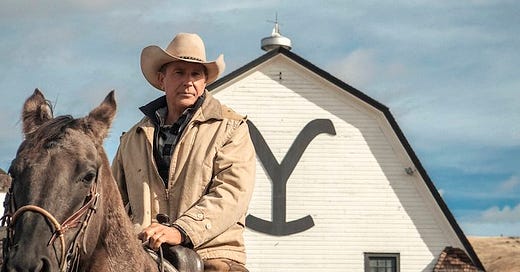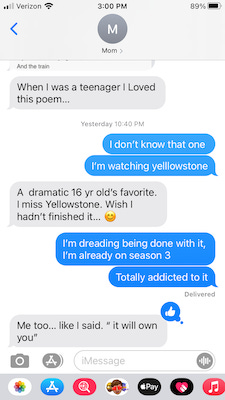The Postmodernist Drinking-Game TV Show, a.k.a.: Yellowstone!
Bad weather got you stuck at home? Here’s one for you.
Some winter weather is headed toward our West and North Texas regions (boy do these parts have my heart: hello, LBK!), but I have a tip for whiling away the time. Grab your nearest bottle of Old Crow and tune in.
I love Yellowstone. I knew nothing of it until this last Christmas, when I was up in Fort Worth, and my mom practically ordered me to watch it. And then she warned me, twice: It will own you. She warned me again even after I was lost in it.
Mom knows me well. She must have sensed I’ve been buried in all things HBO and BoJack Horseman for too long.
I blew through Yellowstone’s available four seasons (Paramount) in three weeks. The pilot is flabby, but it was also, for me, like slipping into a hot bath after two years of feeling completely demoralized. It was like finally going home. I am devastated that I have to wait for more seasons.
I sometimes walk around with this weird “What would John Dutton do?” mentality now, weighing how little work I’ve gotten done in a day against the main character’s work ethic. (The answer to that question is always: get your ass up and work harder.) The show also makes me horny as hell, though honestly it’s not a sex thing. It’s a mojo thing. It’s an energy thing. I don’t know that I would have launched this Substack without it.
Make no mistake: this modern, nighttime western-soap opera can be a mess, plot-wise. Very good people routinely murder other people with zero consequence; its creator, Taylor Sheridan, can be self-indulgent with horse-trick montages; dramatic plot points get lost, buried, or resolved in minutes. My own dad, a native West Texan (and one-time teenage roughneck) who this show is practically made for, stopped watching after the episode when the ranch crew hauls Dutton into a veterinary van to undergo emergency surgery. Dad found it too absurd to stomach.
I wouldn’t change a thing about it. I love the mess, the personal-ness of it. This is not a done-by-committee show that reveals all its compromises. If Sheridan, the native Texan who grew up on a ranch, wants something in the show, it’s in the show. I assume he has a writers’ table, but Yellowstone plays out like a singular vision.
Not much entertainment out there works like this anymore. These days, HR department quotas, public pressure, and identity-politics orthodoxies not only seep into our shows, but wreck them. (Have you watched the Sex and the City reboot? Don’t bother. It’s insulting. And I really do love Sarah Jessica Parker.) All over streaming content now, we’re confronted with awkward, pious dialogue and storylines that tell us how to be gold-star progressives, while we pretend it’s fine. (It’s not fine. It’s hell on art.) I’d say this is part of what David French would dub Conditioning Culture.
I suspend my criticality with Yellowstone. I honestly think it’s because I’ve needed it like I’ve needed a rare steak and a beer (i.e desperately) since June of 2020. It is a pan-fried one-pound rib eye washed down with a six-pack of Shiner. More, please. The show is luxe, it’s baroque, it’s too much.
It’s Texan is what is is, despite being set in Montana.
Some people compare it to HBO’s Succession, because it’s about a dynasty trying to survive changing times. The elite press don’t pay much attention to Yellowstone, though: detractors call it a “red state” show. They mean that it’s conservative, that it’s retrograde. Then why does it feel so fresh to me? Compared to most of what I’ve been watching for the last few years, it’s like a wild bull in your living room. Let’s hop on!
So, quickly: It’s about an irascible fourth-generation ranch owner who can’t let go; he can’t see past the “legacy” part of his role, the historical weight of it. Kevin Costner, who I admit I haven’t paid a lick of attention to since 1994, plays the lead, John Dutton, and he’s terrific. Seasoned, relaxed, with the gravitas we associate with, well, Brian Cox. His grownup offspring, ranch hands, and enemies round out the cast. Don’t get me started on the daughter, Beth Dutton. I adore her. When I watch Kelly Reilly do her oft-nonsensical, mean-cat routine, a Magnetic Fields song pops into my head: I Wish I Had an Evil Twin.
There’s a plot that runs throughout the seasons concerning the ranch’s closest neighbor, an Indian reservation chaired by a character named Thomas Rainwater (Gil Birmingham). This is a rich, complex, and respectful chunk of the show. It’s the opposite of dog whistling. It’s an actual conversation about what has happened, and what is happening now.
Anyhoo: the dialogue is cracking with crisp one-liners and aphorisms. Sheridan is clever: he may be writing for his own entertainment, but his hand is out to the battered souls of a lot of people right now.
The drinking-game part of it is listening for the lines and conversations that are winking rejections of current progressive dogma, and call-outs about its hypocrisies. It can border on snark. (“Behind every milestone of human history stands a monster.” As if.) In this sense, Yellowstone is anti-theory. Anti-Foucault, anti-relativism, anti-postmodernism. These characters may be cold-blooded murderers, but boy do they know how the world actually works, how human instinct plays out. Postmodernist prevarication has no place in this concrete, material world of actually getting stuff done.
To me, all of it feels like good-natured fun, like your favorite cousin razzing you for your pieties. There are at least a few of these lines or scenes in every episode. Maybe not enough to get you tanked on mezcal, but definitely enough to get you buzzed. (How much of the bottle you kill is of course up to you. The worm is waiting.)
Some good ones, across the seasons (possible spoilers ahead):
•In a prison yard, where Thomas Rainwater finds himself after Dutton gets him arrested for cattle theft:
Rainwater: Thank you for such a visceral reminder of what it’s like to be oppressed.
Dutton: Oh, cut the shit, Tom. You’re a Harvard MBA who interned with the PR firm that represents the American Petroleum Institute. You’ve never missed a meal in your fat life.
(Earlier in the same episode, Rainwater is being strip searched. The cop asks him, “Do you have anything that’s going to poke me, stick me, hurt me in any way?” Rainwater, with a smile: “Just my heritage.” I love this man.)
•Beth to daddy Dutton: What this place is facing… it isn't an enemy. It's a perspective. It's a shift in values. The world doesn't value your way of life anymore, Dad.
•Kayce, a Dutton son, to property developer Dan Jenkins (played by the ever-entertaining Danny Huston): Nobody wants to fuckin' kill you. We just want to live our lives the way we have for the last hundred years, and you keep trying to take that away from us. And we just want you to fucking stop.
•An evil developer, Malcolm Beck, says to Beth: That's the problem with playing dirty, Beth. Because when someone plays dirty back, there's no one to cry to. There's no charges to file. There's nowhere to scream about the injustice you endured. Because if you do, all your filthy laundry just spills right out in the open for everyone to see.
If that’s not a warning about the consequences of progressive cancel culture, I don’t know what it is.
Depending on how deeply you’ve read your theory and proto-Postmodernist theory, you may find yourself catching some unlikely gems. I don’t know if Sheridan reads Nietzsche, but I spotted a “tarantulas” (Thus Spoke Zarathustra) reference in a scene where Rainwater says to Kayce’s wife Monica, regarding some crimes on the reservation:
They’re all connected. [He points to a spider web on the porch of her house.] Like that. To look at it, there’s no pattern. No beginning, no end. It’s easy to think a random thing like that just became, all on its own. But you and I know different. We know a spider’s behind it all.
In 1883—the year the Dutton Ranch was founded—a prophetic Nietzche called the coming century’s World Wars and various leftist dictatorships.
Nietzche’s tarantulas say: ”We shall wreak vengeance and abuse on all whose equals we are not. And 'will to equality' shall henceforth be the name for virtue; and against all that has power we want to raise our clamor!” The tarantulas did their thing, and what followed was Stalinism, Maoism, Kim Jong-un, Franco… all that.
Too heavy? Okay, okay. Shots of Cuervo await!






Since I've moved back to stay with my 82 year old father, we have developed a cherished nightly routine after dinner of movie watching...his memory is fading, so we are able to watch the same movies more frequently than likely most people would enjoy...as he is also a born and raised Texan, we watch a lot of movies set here...his favorite is HUD and talk about an older generation vs the newer generation narrative...I think we've watched it so many times, I finally just bought it for him...but from the sound of this show, it might be one he enjoys...he grew up in a very small town just outside of Houston called El Campo and I have spent much time there too...
Oh and in an amusing snippet from a newer David Sedaris book, Carnival Of Snackery, he cites a statistic on spiders from a WaPo article that says if they wanted to eat all the humans on earth in one year, there are enough of them to do so...and still be hungry to eat more...
Texas and spiders...thank you...I've enjoyed it...
Unpopular opinion: I think And Just Like That is really good.